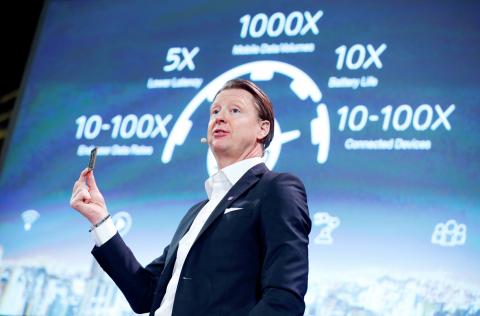Ericsson AB said it would double its cost-cutting plan after posting second-quarter sales that missed analysts’ estimates, as carriers in Europe, Russia and Brazil curbed investments in wireless gear.
Sales fell 11 percent to 54.1 billion kronor (US$6.31 billion), the mobile-network equipment and software maker said in a statement yesterday.
Analysts predicted a 9 percent drop to 55.2 billion kronor on average.

Photo: Reuters
The company is to reduce research and development spending and try to reap efficiency gains from a new company structure.
Ericsson is trying to sell more TV and cloud software to cope with intense rivalry from Huawei Technologies Co (華為) and Nokia Oyj.
Under CEO Hans Vestberg, the Stockholm-based company has sought to boost the share of software and services in its sales mix to reduce exposure to hardware and make revenue less volatile.
The wireless equipment market is set to shrink 5.5 percent this year to US$67.8 billion, according to IHS Inc, making Vestberg’s task all the more difficult.
“The negative industry trends from the first quarter have intensified, impacting demand for mobile broadband, especially in markets with a weak macroeconomic environment,” the company said in the statement.
Adjusted gross margin, the share of sales left after subtracting the cost of production, shrank to 33.2 percent. Analysts predicted 33.3 percent on average.
Vestberg has made acquisitions to accelerate a push beyond wireless hardware. Ericsson bought Telcordia Technologies Inc for US$1.15 billion in 2012 and Mediaroom for about US$200 million to tap into new growth streams, such as billing and Internet-based TV.
The company partnered with Cisco Systems Inc to sell more complete networks and compete with Finland’s Nokia, which agreed to acquire hardware rival Alcatel-Lucent SA last year to add gear used to transmit landline and Internet traffic, giving it a more complete offering.
Carriers are restraining investments after spending billions of US dollars building 4G systems so users can stream music and video on smartphones and tablets.
Mobile data is expected to soar 10-fold over the next six years as users turn to services from providers such as Netflix Inc, but Europe’s biggest telephone companies have warned that investments in faster 5G networks might be held back by regulations on so-called net neutrality.
Shares of Ericsson have slumped 22 percent this year, giving the company a market value of 214 billion kronor.
Vestberg and Ericsson have spent the past few months fending off criticism from investors over the lackluster share performance during his more than six years at the helm.
He has faced questions on probes into alleged corruption in Asia and Europe, and on Monday the company rejected a report in Swedish media that it might be inflating sales by booking revenue before some clients are invoiced.

To many, Tatu City on the outskirts of Nairobi looks like a success. The first city entirely built by a private company to be operational in east Africa, with about 25,000 people living and working there, it accounts for about two-thirds of all foreign investment in Kenya. Its low-tax status has attracted more than 100 businesses including Heineken, coffee brand Dormans, and the biggest call-center and cold-chain transport firms in the region. However, to some local politicians, Tatu City has looked more like a target for extortion. A parade of governors have demanded land worth millions of dollars in exchange

Hong Kong authorities ramped up sales of the local dollar as the greenback’s slide threatened the foreign-exchange peg. The Hong Kong Monetary Authority (HKMA) sold a record HK$60.5 billion (US$7.8 billion) of the city’s currency, according to an alert sent on its Bloomberg page yesterday in Asia, after it tested the upper end of its trading band. That added to the HK$56.1 billion of sales versus the greenback since Friday. The rapid intervention signals efforts from the city’s authorities to limit the local currency’s moves within its HK$7.75 to HK$7.85 per US dollar trading band. Heavy sales of the local dollar by

Taiwan Semiconductor Manufacturing Co’s (TSMC, 台積電) revenue jumped 48 percent last month, underscoring how electronics firms scrambled to acquire essential components before global tariffs took effect. The main chipmaker for Apple Inc and Nvidia Corp reported monthly sales of NT$349.6 billion (US$11.6 billion). That compares with the average analysts’ estimate for a 38 percent rise in second-quarter revenue. US President Donald Trump’s trade war is prompting economists to retool GDP forecasts worldwide, casting doubt over the outlook for everything from iPhone demand to computing and datacenter construction. However, TSMC — a barometer for global tech spending given its central role in the

The Financial Supervisory Commission (FSC) yesterday met with some of the nation’s largest insurance companies as a skyrocketing New Taiwan dollar piles pressure on their hundreds of billions of dollars in US bond investments. The commission has asked some life insurance firms, among the biggest Asian holders of US debt, to discuss how the rapidly strengthening NT dollar has impacted their operations, people familiar with the matter said. The meeting took place as the NT dollar jumped as much as 5 percent yesterday, its biggest intraday gain in more than three decades. The local currency surged as exporters rushed to